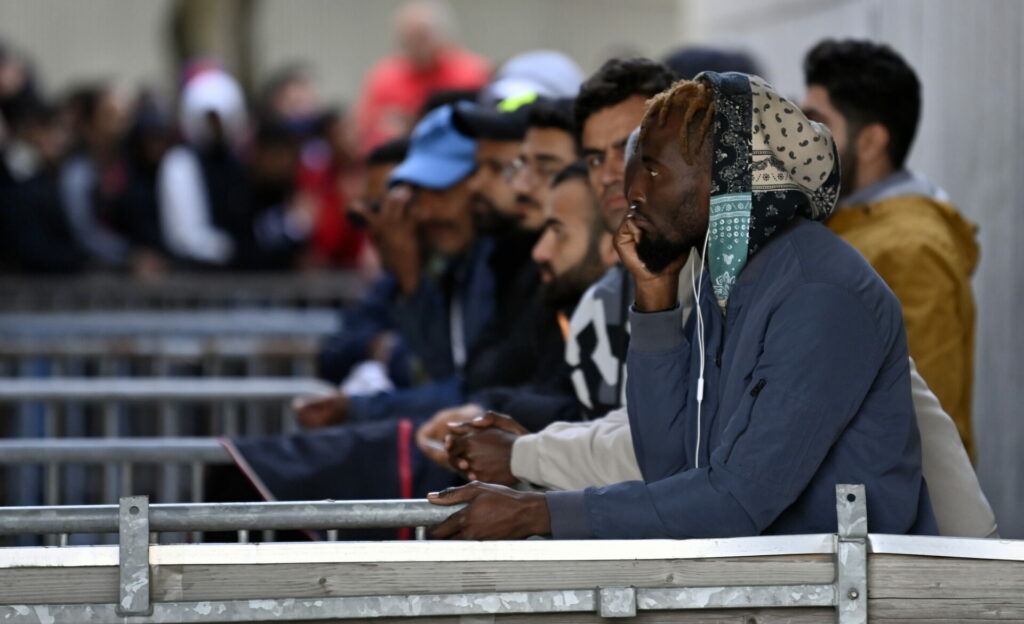Belgium's asylum reception crisis has been going on for over a year, leaving men, women and children on the streets for weeks. On Friday morning, Brussels mayor Philippe Close stated that the situation could "not last for another week."
On Thursday night, Belgium's Federal Asylum agency Fedasil again failed to fulfil its legal obligation of providing asylum seekers with the shelter they are entitled to, putting over 100 people – including families with very young children and unaccompanied minors – on the streets.
"We have suggested hospitals and care homes as possible shelters but we don't have the staff. Surely it can't be that difficult to get 200 people," Brussels mayor Philippe Close told La Première. "I can't accept that this goes on another week."
"I can understand that residents are indignant and don't understand that families are sleeping outside while the temperatures drop... The Brussels mayors have taken responsibility and provided buildings, now Fedasil must provide staff."
Staff shortages
Additional staff is exactly the issue, as reception centres are acutely understaffed. In mid-October, federal ministers agreed to temporarily assign 150 employees from other departments to Fedasil, but this failed to provide a short-term solution.
The shortage is the result of the Federal Government's decision to reduce its reception capacity and close Fedasil centres after the previous migration crisis. It failed to sufficiently increase capacity again when the influx picked up again last October – a fact that Fedasil staff have protested three times under the current government so far.
"We have suggested numerous solutions, such as the Bordet hospital, for example, which is now full," Carole Poncin, Close's spokesperson told The Brussels Times. "We have also suggested a whole list of other places but we can open up as many places as we want, we need Fedasil staff to operate them."
Poncin stressed that Fedasil is a federal organisation and therefore the responsibility of State Secretary for Asylum and Migration Nicole de Moor. Last month, Close said the same after he ordered the Brussels police to take down a row of cardboard tents that underage asylum seekers were sleeping in and failed to provide an alternative solution.
Action by Fedasil to highlight the inhuman consequences of the migration crisis, in Brussels, on Thursday 20 October 2022. Fedasil staff, joined by other organisations, have stopped their work for an hour in front of the 'Petit Château'. BELGA VIDEO NILS QUINTELIER
For her part, de Moor told LN24 on Friday morning that Fedasil staff are working "day and night" to find places for those who are legally entitled to shelter.
"We give priority to underage asylum seekers, but have not always succeeded in getting them a place," she said. The minister added that "many" sheltered places have already been created but that Fedasil is reaching its own limits.
Related News
- Belgium's reception crisis: Over 100 families and children on the streets tonight
- ECHR scolds Belgium for failing to provide shelter to asylum seeker
- Whilst Belgium fails asylum seekers, volunteers bear the burden
"The asylum system is under great pressure," she said in response to the leader of the Flemish liberal Open VLD party Egbert Lachaert, who previously said that "full is full." De Moor stressed that words matter and that a real debate is needed.
"We cannot let the debate be held hostage by extremes. Lachaert's point was about reception and the fact that we need a more balanced system," she said. "The existing structures are full, but the country is not. The asylum system is under great pressure, but we are not against migration."
Belgium's reception crisis explained
For more than a year now, hundreds of asylum seekers have been sleeping rough as a result of Belgium's failure to provide them with the shelter they are legally entitled to.
Fedasil, Belgium's Federal Asylum agency, operates several reception centres across Belgium (of which Petit Château in Brussels has become the most notorious), where people who have been granted asylum in the country should receive a bed, bath and food (or a sheltered place).
Once the rush of asylum seekers coming to the country temporarily slowed down following the migration crisis, the government reduced the number of sheltered places, closing down Fedasil centres.
Since October last year, this figure is once again increased slowly, and the government is not responding to the rise in demand for sheltered places.
Instead, it created a waiting list which prioritised minors and families with children, leaving single men to sleep on the streets, and resulting in Fedasil being convicted more than 4,500 times for failing to provide shelter.

